
The Diggers were meant to be loose, free and vaguely anonymous — or pseudonymous — but perhaps inevitably, some people’s names got out. Usually they were the ones who spoke to a reporter.
And there were a lot of reporters in the Haight-Ashbury during the Diggers’ heyday of 1966-8. Such was the Diggers’ presence and notoriety that seemingly every reporter filing a story on the Haight — even, memorably, a typically dyspeptic Joan Didion, for the Saturday Evening Post—included the Diggers in their account.
“A band of hippie do-gooders,” said Time magazine. “A true peace corps,” wrote local daily newspaper columnist (and future Rolling Stone editor) Ralph J. Gleason. “A cross between the Mad Bomber and Johnny Appleseed,” said future Yippie Paul Krassner in The Realist, “a combination of Lenny Bruce and Malcolm X, the illegitimate offspring resulting from the seduction of Mary Worth by an acidic anarchist.” Didion wrote, “In the official District mythology, [the Diggers] are supposed to be a group of anonymous good guys with no thought in their collective head but to lend a helping hand.”
Who were these guys? Actor Peter Coyote and the late Emmett Grogan are the usual names associated with the Diggers (and their later incarnation, sometimes called the Free Family collective), as they wrote books chronicling their participation in that era; Grogan’s Ringolevio (1972) is the most notorious. But there were many others who remained anonymous while participating in the various wildly audacious Digger initiatives of the time. (A vast archive about the Diggers is maintained by Eric Noble at diggers.org)
One of them is a man named Chuck Gould. Prior to interviewing Chuck in 2010 at his home in Petrolia, California, I didn’t know much about him, other than his name was the photographer credit for the bulk of the rather striking black-and-white photographs featured in Coyote’s memoir, Sleeping Where I Fall (1998). In conversation I found Chuck’s avuncular outspokenness, street lawyerly bluntness, and Buddhist bottom-lineness to be as striking, refreshing and vivid as his photographic portraiture. No mythologizing here; just facts, laughs and tough reckonings.
The following text is for the most part how the conversation flowed that morning; it has not been edited down for a general audience, and many incidents and personages are spoken of without context, or only in passing. There are, inevitably, a few digressions. As usual, my advice to the casual-but-curious reader is to simply let these unfamiliar/unexplained bits pass. Keep reading, there’s a good chance you’ll like the next part.
This presentation has been prepared in extensive consultation with Chuck in the last few weeks. Any errors of transcript are mine, and notice of any corrections of fact would be greatly appreciated.
This is the second in a series of interviews with Diggers that I am presenting online for the first time. The first was with Phyllis Willner. More to come.
If you would like to support my work, please donate via PayPal. All donations, regardless of size, are greatly appreciated. Thank you!
— Jay Babcock (babcock.jay@gmail.com), Feb. 9, 2019
Jay Babcock: So both you and Phyllis Willner spent time at Millbrook in 1966 prior to arriving, independently of each other, later that year in San Francisco and getting involved with the Diggers. How did you get to Millbrook?
Chuck Gould: I got to Millbrook through a loose extended family called the Group Image. The Group Image was a multimedia light show/rock n roll/kookarooka thing. We had a loft on Second Avenue and Fifth Street in the Lower East Side of Manhattan. There was a big neon purple sign that flashed “Show Biz” on and off onto the street, and it was where we kept instruments, equipment, art materials and stuff like that, and where people crashed. Freeman [House] was publishing a magazine called InnerSpace with Martin Carey, who was doing a lot of the artwork for it. It was a small world even in those days, even in New York. So Freeman and I met each other. He would come to the loft to get out of the cold and write.
I went with the Group Image to Millbrook because [Timothy] Leary was doing a movie—I don’t know what the movie was about but it was all kinda crap. A bullshit “advent garde” movie. And Leary was bullshit also, I might add. Trust me, I lived with him long enough to know that he was. He was basically an opportunist. He had no real social conscience or progressive political position or any of that stuff. He was simply in it for the fame. And the women. Regrettably he drank a lot and it was rumored that he couldn’t get it up. Alcohol: not good.
So, we went up there to do this movie. ’65-6. A lot of people were up there. A lot of people would come up there—Michael Bowen (from whom I first heard the term “far-out”) from San Francisco, poets would come up there, Indian gurus would be up there, weirdos and whackjobs and all these pretentious self-styled hipsters. This was the Hitchcock estate. Peggy Hitchcock was a very wealthy woman, or her family was wealthy. That’s where I met Phyllis. I remember her sitting in a wheelchair; her face painted black and white and looking “witchy.” She left after the filming and party was over and I stayed because I had gotten involved with Leary’s secretary, who was 10 years older than me. She was very lovely. After that time in Millbrook I came to California.
Where did you grow up?
On Long Island, outside of New York, and I went to college in Boston. My father and mother were first-generation Americans. He was an importer of fine arts and antiques, and also sold a line of silver-plated ware. My mother was an educated housewife. Four children. We lived in Brooklyn initially and then in Great Neck. I’m the second oldest. Jewish, very Reform. I went to Boston University and was Pre-Med. I have a bachelor’s in Zoology, which means nothing in the bigger view of things except now when I castrate my bull calves I know how to clamp off the bleeders.
When I was in school in Boston I started taking acid, smoking pot, going to socialist meetings and the bottom kind of dropped out. I had always considered myself as politically left, enjoyed jazz, read Marx and poetry and so I began to trade one delusion for another, which we all do. I came to San Francisco by way of Aspen, Colorado where I’d had some history ski bumming, earlier. I arrived around Thanksgiving of 1966. I never looked back. I knew I was home and intuitively “recognized” everyone on the street. Home.
What were you doing with Group Image in New York?
Well, I wasn’t a musician, but I worked a lot doing the light shows while others designed posters and played rock concerts. There was lots of groups like this around.
I remember there was the Seattle Lightworks, they used to travel around and do light shows, and they would come and stay with us. The Grateful Dead would come to New York and play in an abandoned bandshell in Tompkins Square. Richie Havens would open and then the Dead would play. The Grateful Dead would come up to our loft to hang out. I remember Bobby Weir wearing eagle feathers in his hair. I was knocked out by them. Ed Sanders had his Peace Eye Bookstore right there. There was all kinds of alternative stuff going on right there in that neighborhood. The Fugs, Tuli Kupferberg, all those guys were around. I just recently saw Ed Sanders up in Millbrook, with Martin and Susan [Carey], who are good friends. It was all very crazy because Martin and Susan were good friends of Freeman’s. I didn’t know that. I met Freeman and I met Martin and Susan independently, and then Freeman came to San Francisco — was brought to San Francisco, supposedly. There were some rather pompous people around the Diggers in those days who thought that they were really doing earth-shattering things. Anyway, I said to him, “Hey man, we know each other” [from New York]. Of course he remembered and we became good friends.

How did you get to San Francisco?
Well, I had heard about what was going on in California. If you were at all attuned to what was going on in the alternative universe, so to speak, then you knew that San Francisco was one of the epicenters. I went around Thanksgiving of 1966, and lived briefly in an apartment somewhere in the Haight-Ashbury with some people I knew from Colorado.
One day, I’m walking down the street in the Haight-Ashbury and here comes Phyllis Willner, wiggling up the street. Wow, blah blah blah. She said, “Come on I’ll take you someplace,” and we went to one of the communal houses that the Diggers were doing and I got immediately involved in what was happening. It seemed to me that the things that the Diggers were attempting and the predicates that were behind these activities were something that I related to, and were very far-out and seemed to make a lot of sense. And: it was all great, great, great fun. And of course you’re dropping through the rabbit hole at that point in time—you have to understand, this was, for me anyway (I can’t speak for anybody else), in those days the rush of freedom—being out of school, being in your twenties, at the peak of your game physically and all that stuff, taking heavy-duty psychedelic drugs that were opening up this vast cavern, this abyss, of extraordinary insights and imagination, this was all happening at the same time. TOTALLY free. Invincible! No more school or parents. No societal restraints. Gone, that was all gone. I could do whatever I wanted. Endless mananas. In your twenties, you have endless mananas. Tomorrow is tomorrow is tomorrow. And so I got involved with what was going on with the Diggers, although no one wanted to be pigeonholed or characterized in any way.
The only communal house I ever lived in, other than Forest Knolls [in the ’70s], was Willard Street. I lived in my own places. I always managed to find a way to live, or had a girlfriend that I lived with, or lived on the street, or slept in the park. I really didn’t care. As it was, I never had a permanent room at Willard Street. I lived in the coal bin in the basement, where we did Free News. I lived in that coal bin with Ron Thelin on and off.
There are other connections going back to New York. Martin Carey, this guy that I told you about, was Abbie [Hoffman]’s very, very best friend. They grew up in Worcester, Massachusetts together. There’s this famous picture of Freeman marrying Abbie and Anita, and I think Marty is sitting somewhere in the back of that Times photograph in Central Park. It was during this period of time that I met Freeman and all this stuff was going on in New York’s Lower East Side or the so-called “West Village.” We would hang out at Abbie’s St. Mark’s Street pad. It was a psychedelic circus of lefties, street people, artists etc. Martin Carey did some amazing artwork for Digger publications. When Abbie was on the lam [1974-80], after the cocaine bust and all that shit, which, I’d lost track of all these people, I knew Jerry Rubin in New York in the early 1980’s when he’d turned into a faux businessman and was doing his networking thing, I used to go to his parties and stuff like that, but… Marty would go and meet Abbie in airports and bus stations, he’d put on a crazy hat and a beard with a nose, just ridiculous, and he’d go and they’d pass each other in the room and he’d hand him an envelope and then keep going. It was money so Abbie could keep running. They wouldn’t stop and talk. It was hard for them. They loved each other a lot.
So, late 1966, you fell in with the Diggers. Who were you impressed by?
Well, I was of course impressed by Bill Fritsch [aka Sweet William or Tumbleweed]. I’d never met anybody like him before. Emmett [Grogan] was an enigma who would disappear a lot. Peter Berg and Peter Cohon [aka Coyote] and some others seemed to be from another planet. And being around rock musicians, poets, Black Panthers [see video clip below] and Hell’s Angels was damn exciting and turned my head around to a different way of seeing reality.
Above: A clip from the documentary feature film Revolution, directed by Jack O’Connell, shot in 1967. In this scene, shot inside the Black People’s Free Store at 1099 McAllister Street in the Fillmore district, an unidentified speaker (possibly Roy Ballard), talks about what a Digger is, what the free store means for the black community and what’s going on in the Haight-Ashbury. The gentleman’s monologue begins around 6:08 and lasts for 95 seconds. Disregard what follows his speech.
Who was Bill Fritsch before the Angels?
He was William Fritsch, a Jewish former New York longshoreman long before the Diggers and Angels. He was Lenore [Kandel]’s boyfriend. He was a well-known member of the bohemian/beat/art community in North Beach, a lot of which centered around the the Committee theater group, Caffe Trieste and places like that. And Ferlinghetti’s bookstore. All that group from the ‘50s that he and Lenore had run with. He and Lenore had moved into Gregory Corso’s apartment on Chestnut Street. Gregory lived there with Belle and Belle’s daughter Sasha. They there together for a number of years and so when Gregory moved on, Bill and Lenore moved into that apartment. They lived there, and that was a center of activity. People got their ears pierced, got high, shit like that.
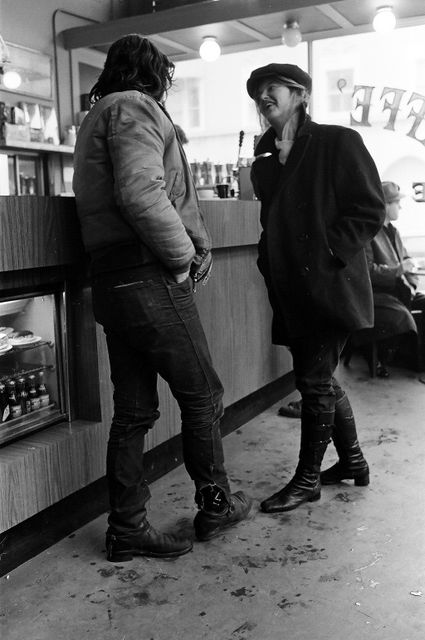
Bill was quite a fascination to a lot of us. Here was a man who was incredibly charismatic and handsome, vital, virile guy with this amazing poet wife. They actually were married, and remained married until she died. They just never got divorced, for whatever reason. Medical insurance? Who knows what they were doing. They were estranged at the end. Sad.
So I was very impressed with Bill, because he was so different. Drove a motorcycle. Shot dope. What did I know about this kind of stuff?
Who else impressed me? None of them ‘impressed’ me really, to speak of.
Okay: impressed, enamored, whatever… Who were the people who were doing Diggers stuff that made you want to get involved with them?
That’s just what kind of happened. You fell into it. You’re living in a house and people say tomorrow we’re gonna go to the produce market [to procure ingredients for the daily Free Food event in the Park] and blahblahblah. I said, I’m coming with you. That kind of thing started to happen. Food preparation. Street theater. Those kinds of activities. Other events. This is a long time ago, I mean… Peter [Coyote], who’s still a good friend of mine, wrote a book about the time, and the first thing I said to him upon reading it was, How do you remember this stuff? Come on man. Get serious. Everybody was stoned all of the time anyway. I can’t even remember all this shit. He says Oh, I kept a journal. [laughs] To which I said, Oh. Okay. Cuz there’s all this contention about Peter’s book as to what was true and what wasn’t true; memory is a funny thing.
What about Emmett Grogan? Were you impressed by him?
Emmett was an impressive guy. Emmett was an enigma, Emmett was elusive, Emmett kind of ran in a number of different circles. It was very clear that Emmett was very committed to Emmett, and that what Emmett was doing was very, very interesting and important and vital, but that he always appeared, in my opinion, to have a hidden agenda. And part of Emmett’s agenda was, in my opinion, hyping up the notoriety that came as a result of just being Emmett Grogan and having been in the Artist Liberation Front Council or whatever it was that people were involved in, in the early days in the Haight and the advent of the radical new progressive politics of “Free.” I leave the precise articulations of this “New think” to those of us who are more versed than I am.
Yeah, this kind of stuff. Emmett was someone who, early on, had gotten into hard drugs and that kind of made for a bit of a separation between him and other people. Emmett was very secretive. He didn’t like to be photographed. He even told me not to take photos of him and I didn’t. Emmett was paranoid. He was sure, and he may well have been right, that he was on somebody’s enemies list—you know, using the old Nixon term, “enemies list.” He was very charismatic and he was a lot of fun to be around, when he was fun to be around. I mean, I remember going with Phyllis… Emmett had broken his arm, I don’t know when this was. He had broken his arm and Phyllis and I were taking him to the hospital. Must have been to S.F. General, because where else would hippies go but to General. Emmett checks in, they want to know his name. No one had ID in those days—if you did, it was phony ID, completely made up. So he says his name is Roger Payne. Because he has a broken arm. He spells it out P-A-Y-N-E. They put us in an examination room, the nurse goes out, and he immediately starts to rifle the drawers. He’s looking for needles and the syringes, which he finds and he puts in his pocket. And as he puts them in his pocket, the nurse comes back in the room and he turns around and you hear this rustling. She pats his pocket, she says What’s that? And he says, Potato chips! And the three of us run out of the room in different directions and disappear into the night. This was life with Emmett.
It was that kind of thing. It was crazy. I remember once being with Emmett and Ron Thelin. Ron had a white Chevy panel truck, closed panel truck. What we were doing, why I was there, I have no idea. We drive it along and we pull up to a light and there in front of us is a butcher truck, stopped, the doors are open, the guy is hauling a quarter of a cow into the butcher shop and the back of the truck is open and hanging with meat. Immediately Emmett sees the opportunity to steal meat. We pull over, and he says to me, Go get some meat. Me, right? I run over to the truck, I jump into the truck, I unhook—it’s hanging on a hook—a thing of meat, run back and throw it in the back of the panel truck just as this guy comes out of the shop he was delivering to. He yells, “Hey,” we slam the doors and we drive away and we take the meat to Paula’s house. Paula McCoy, where he was living. Well, he may have been living with her—I never knew what the nature of their relationship was… Emmett was into star stuff. He liked that whole hippie royalty notoriety—this is my take on him now; again, this is strictly my perception, who knows what was going on?—but he liked that stuff. He liked going to Hollywood, he liked hanging out with Dennis Hopper, that kind of crap.
Well, he was hustling for money for the Diggers, right?
Whatever he was hustling—he was hustling. You got a sense it was contrived. Hidden agendas. Okay, so he then proceeded to butcher this meat right in Paula’s kitchen. Now, I also remember that around time, a kind of poignant but predictive thing happened. There was a family meeting at Pierce Street, which was one of the houses we had—David [Simpson] and Jane [Lapiner] were living there in the attic, I think Freeman was living there too. The Pierce Street house had been where a seder had taken place that turned into kind of a debauchery scene like most of these things did. The meeting was about what to do next. Bear in mind, the whole “Digger thing” was maybe two years. What happened after that, the so-called “Free Family” and all that other stuff leading up to us sitting here that went on afterwards, also incorporated all of the nuances of Digger craziness and the paradigms of Free and all of that stuff, but it wasn’t being done by an organization that characterized itself loosely being the Diggers… The “Who’s in charge? You’re in charge” period, that was kind of over.
And part of the reason it was over is that by 1968, people were moving, families were coalescing, people were hooking up with women, children were starting to being born, things were changing. The Haight-Ashbury were filling up with people who had no ethical or spiritual or philosophical or intellectual goal or direction whatsoever. They were there because they had heard some music that appealed to them, they’d smoked a joint and decided to drop out and come to the Haight-Ashbury. And it turned into something that… Well. I never considered myself to be a “hippie.” I don’t think any of us did. The whole concept was kind of weird. “Hippie”: What is that? We were there because we wanted to kick off a revolution. That is what I wanted to do. I had come from a very bourgeois middle class background. I had seen a lot of things, I had kind of dropped the stuff away, and now a lot of things that I had thought about when I was younger coalesced into more cogent ideas that now had some semblance of a new radical political-economic-social paradigm.
So what we were doing really appealed to me, you know? In those days going to construction sites with Kent Minault and stealing construction material was perfectly okay. Today, I say to myself, Well it’s stealing. You can call it whatever you want. You can call it redistribution of wealth, you can give it all kinds of fancy names, but hey, guess what? You’re stealing. This all came back to haunt us [in the ’70s] when our children started shoplifting. You get a phone call, your five-year-old little girl has been shoplifting, she’s been caught. Then we’d go, Oh my god, of course she’s shoplifting. She learned this from us. So, when children get born, things change. Your perceptions of everything shifts toward the center a bit. But I digress.
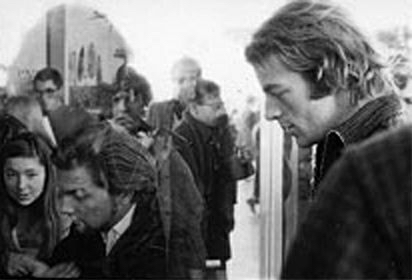
So, there was this meeting that took place. This would’ve been maybe 1968. I remember Bill was there. I remember that because I asked him to take me someplace on his bike afterwards and he did. Scared the shit out of me. Emmett was there. Emmett had started not to be around a lot, by now. He would go to New York, he would go to London, he was deeply into a heroin habit I think by then. He had a bike and he’d become very elusive, paranoid. He was living I believe with Joanie and Billy, the Batpeople, on Roosevelt Street, in the top apartment of the building that Pete Knell had rented. Pete was the president of the Angels in San Francisco. [Freewheelin] Frank Reynolds lived there also. I have photographs of him in that apartment, of Frank in that apartment. In that house, whatever it was. It’s all gone now. Upscale housing. Highest and best use they call it.
Emmett had made a suggestion. The meeting was about “what’s next…?” The suggestion that Emmett made, and there was this rivalry, I’m probably gonna get in trouble for saying this, but so what, there was a rivalry between Peter Berg and Emmett. That’s the fact. People can say I’m crazy, I don’t care what they say, I’m telling you there was a rivalry between them. It was a power thing. Who’s the smartest, the fastest, who can come up with the most out-there, relevant ideas. It wasn’t just about hanging out… we had a mission. A passion. Every piece of “Free News” that got published had a very specific message, you know, as to what it meant, and what it was supposed to be, and what its intended message was. Obviously it wasn’t news about what the mayor had done that morning. It was about doing your “own thing.” So, Emmett’s idea for the next shot was to do a free butcher shop. I don’t know what he was really thinking about, but this apparently was just an extension of the free store/free free free mentality. And I remember that this was knocked down at this meeting, and it seemed in my mind to create some bad feeling. That now it was not a “do your own thing” thing, it was people kind of lining up in different camps and there being people who wanted the appearance of being leaders and people who weren’t interested in being overtly leaders. To a large degree I think that was, in my mind, the last formal Digger function that took place, that meeting. Now, whatever we continued to do… the “liberation” of City Hall, etc. — that all seemed, to me, to have a different flavor or feel. But I remember that being the sense a lot of us had. Death of Hippie. Death of Digger.
I always perceived a bit of an egotistical power struggle that went on between some of these guys. It was irrelevant to me. It was something that I didn’t want to know anything about. It wasn’t nice, as far as I was concerned. After all, It was antithetical to what we were supposed to be doing. To who we were. And things like that come up all of the time. That stuff just comes up in people. Human nature?
The other people I remember from that time… Kent [Minault] was so much fun to run and do shit with, it was just always hysterical to be with Kent. Vinnie [Rinaldi] was another friend whose lifestyle and often inverted thinking influenced me greatly. Brooks [Butcher] was a sad case. I didn’t know him that well, but he was a sad case. Obviously, I was close friends with Freeman and David and Jane and the Bergs and all of these people. We were all around and we lived with each other, on top of each other, whatever. And Phyllis, Julie [Boone] and Natural Suzanne [aka Siena Riffia]—she was no longer with Emmett by now, that was over, and lots of other people. Our extended family eventually began to morph into almost a biological family.
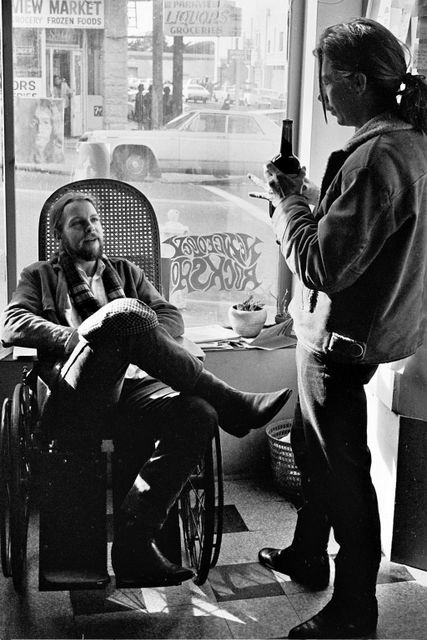
What about Bill Murcott?
Oh yeah. I loved Billy Murcott. Still do. He left San Francisco and went back east. I think I got to know him better years later. He was really the main architect of the politics of “Free” I think. Mostly in retrospect. His social, economic and political insights were profound and right on. Why he left and went back to New York is still not clear to me but I think it had something to do with his sense that things were swinging away from the early vision. Maybe. Just my take. Ya gotta ask him. Not that he’ll talk about it a lot.
Siena [aka Natural Suzanne] says Emmett worshipped Billy.
Yes. They were friends from New York, and I don’t know if they came out together and all that stuff, because remember, I arrived let’s say end of ’66/beginning of ’67, this was rolling by then. So I walked into the middle of something that was already happening. I don’t know about Phyllis’s connection to those guys from before, I have no idea. I know she was in some way connected to Nina, or maybe to Julie? Julie Boone.. Julie was really central to all this. She was a very close friend of Nina and Phyllis’s. And my lady friend. I adored her but didn’t treat her right. Too much male macho stuff. One of my regrets.
Who were Bill and Ann Lindyn?
Bill and Ann were Mime Troupe folks who developed a medieval style or Dell’arte, Punch and Judy show. They created a moveable theater, the Free City Puppets, and would pop up around town and preform puppet shows, the content of which embodied progressive and Digger thinking. And it was hilarious. The kids really loved it and got what they were getting at. Destiny [Gould] and I lived with them off and on and played in the shows with them. I remember being cast as the puppet called “The Judge.” A hated character whose only lines were: “guilty, guilty, guilty. Death!” Then the audience would boo me and throw shit at me. I was so happy!
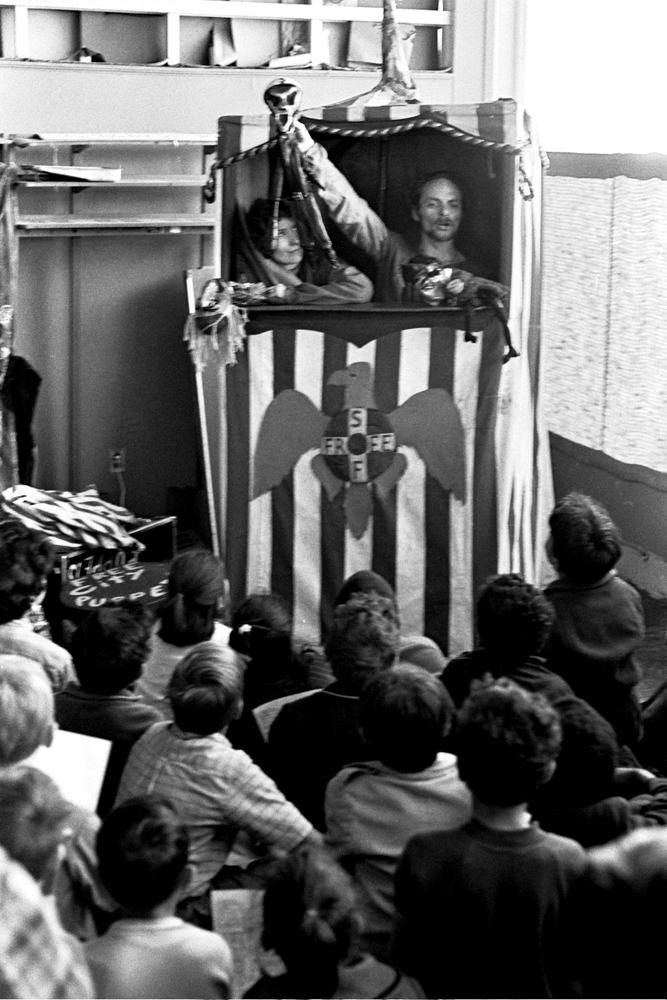
What did you think of Richard Brautigan?
I didn’t like Brautigan. I never considered him to be a hippie or anything. I thought he was a bad poet. That’s all I know about Richard Brautigan. I didn’t care for his style. I thought it was bullshit with the hats and scarves. I thought he was something of a weird guy and using us.
What can I tell you about Kirby? I guess I really met Kirby through the poets, or through Billy Batman, who was a painter, not a poet. Again, Batman is one of the guys who go back to this scene in North Beach in the late ‘50s. I met Kirby in the City, he was very much into amphetamines. He was kind of a wild flamboyant guy. He eventually ended up living in Forest Knolls with his girlfriend and they had a child together whose name was California. Kirby died in Yerba Buena hospital, I went up to see him right before he died. Kirby was a wild guy. An out-of-control kind of guy. He was not involved, per se, in any of what was going on. He did some things that were published in the Digger Papers. Kirby was influential in the way that all the poets were, as Gregory was, and Lenore, and Lew Welch, but then Lew disappeared. Suicide. Gary [Snyder] was in and out. And Diane di Prima of course. We spent a lot of time at her house. I remember being at her house on Oak Street, right on top of the Panhandle. She, and Alan Marlowe, There was a whole poetry scene there, and we would go there and eat. And take acid on the full moon. We’d eat anywhere we could.
I think that Kirby’s and the poets’ influence or role was one of idea incubation. Oh, they would come to City Hall steps and read poetry. But you wouldn’t catch them going out on food runs. Or doing any of those other things—these shots, these bits. They weren’t really involved in stuff like that. Lenore was, in the beginning. But then Lenore kind of withdrew. When Bill got involved with the [Hell’s Angels] club, Lenore withdrew to a large degree from a lot of these activities, although their house on Chestnut Street was still a center—but only while Bill was prospecting the club. Then they kind of disappeared from the scene, which was really sad—a lot of people felt badly about that, that we’d lost Bill to the Angels. We saw that was not gonna be such a good thing for him. Which it was not.
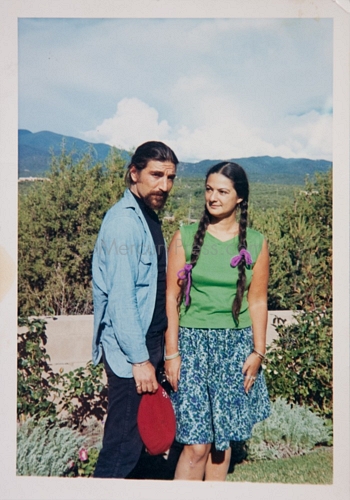
How much of a connection is there between Altamont, the Hell’s Angels and the Diggers?
I don’t think there was any direct connection between Altamont and the Diggers. I know Emmett was there… but Altamont was something that unfortunately, I think, was a turning point historically, at least in terms of the American public’s perception of what was going on with the alternative community—that it was violent, drug-ridden, all of that stuff. I did not go to Altamont. I remember being in an apartment, it may have been the Bergs’ apartment, the morning that it went down and hearing about these things. I don’t know if Emmett and those guys were there, maybe they were. I know Billy [Fritsch] was there, because he was in the club by then. You see him in the films of that so called concert.
Anyway, Altamont was nothing that would have had any direct relationship to what we were doing. I mean, theoretically, and at its most pristine incarnation, the Digger vision, if you could even characterize it as such a thing, was really an attempt to evolve alternative social, political and economic paradigms. Which ultimately led to a sense that we were anarchists because there wasn’t any extant system that we could relate to. Ultimately that level of anarchy really puts you in free-fall in many ways, including emotionally. It leads to no good. You can understand the connection. It’s like too much of a good thing. Like drugs or sex.
You think it was bound to fail because of that?
No, I never said it was bound to fail, and I don’t think it was intended to succeed, or not succeed. It wasn’t that kind of thing. It was meant to be kind of an ‘Invisible Circus’ kind of thing.
Did you attend that?
Yes. I remember mostly that there were a lot of bizarre and grotesque and wonderful things going on—people having sex in the church, all this other stuff, a lot of crazy shit was going on. You know, you go there, you take acid, you drink wine, you smoke weed, the music, the lights… Who can remember this stuff, right? Who can remember?
Anyway. I don’t want to sound like I’m slandering anybody. The truth is, people talk a lot about all these things that were done, like the food trip or free stores but the real work or “do” of it got done by people other than the people who may have come up with the ideas. Kinda weird but it reflected a growing hierarchy which again was antithetical to so-called fundamental Digger thinking. You know: Who is in charge? You. No one.
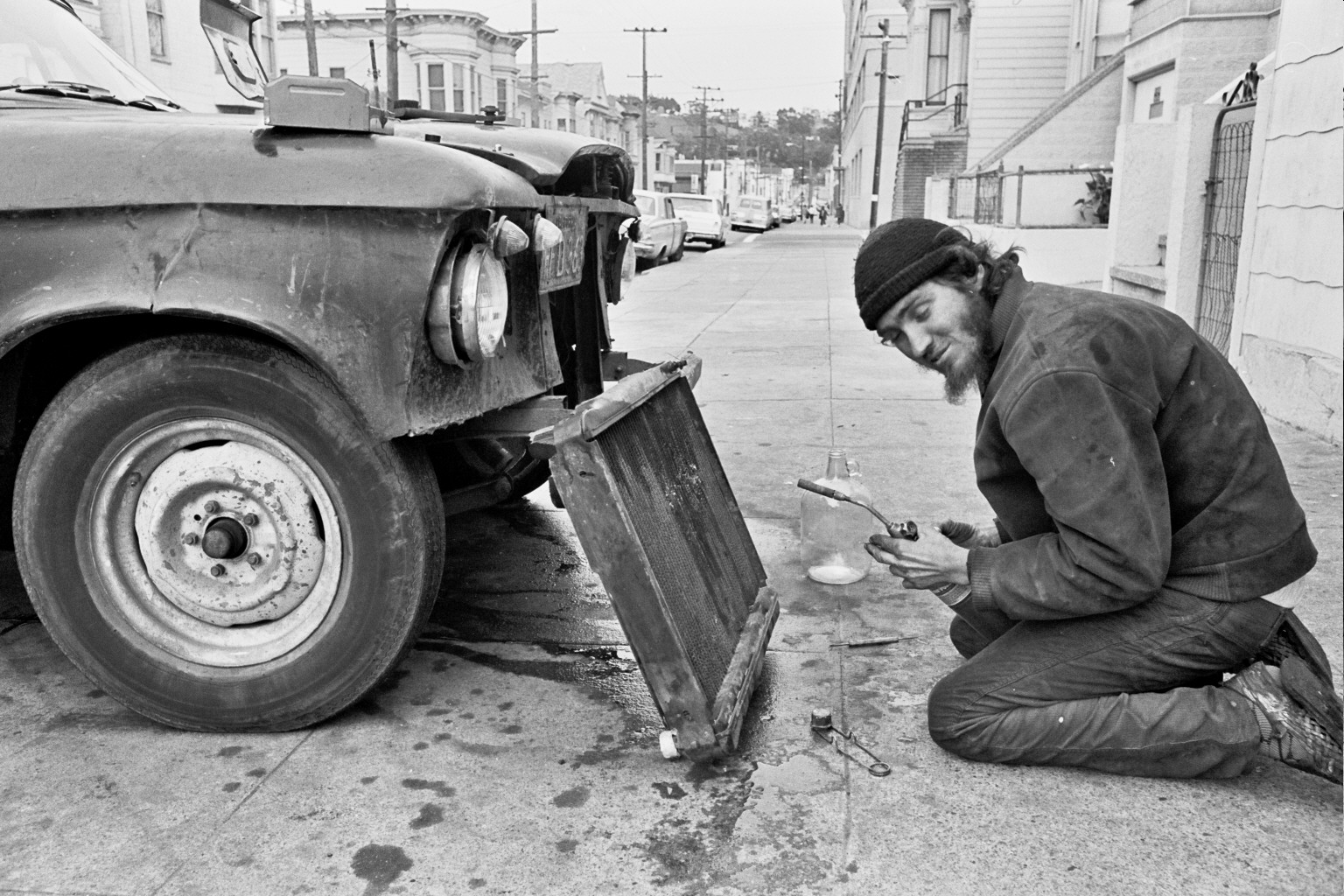
Did you know Chester Anderson?
Didn’t know him that well, didn’t know the Communication Company that well. Knew Claude [Haywood] and H’lane, but not well either. They were not directly involved with us. They didn’t live with us. Chester was an inspiration for me. His early writing was kinda profound.
How important was LSD?
In my opinion, it was huge. It was almost everything. There’s a lot of people who denied it for a long time because to acknowledge it would be kind of demeaning. But for me, myself? Those experiences were the experiences that broke the old mold, destroyed old conditions and then there was just a universe of endless possibilities. And in that context, one was able to see what was missing, what was beautiful, what wasn’t beautiful, and begin to, in this totally new world, where anything goes, one was able to begin to develop reasonable new paradigms.
The other stimulant, in addition to acid and other drugs and our social experiments was the configuration of the universe at the moment in time, which included not just the configuration of the stars, but also the war, and the Kennedy assassinations that had been taking place. And all of the stuff going on. The nascent woman’s movement. The gay liberation. The African-American unrest that was beginning to be really well articulated with all the people that were involved in that movement. All of those things going on—and the one magic ingredient: YOUTH. Youth was huge. This is the kind of thing that never would have happened in a population of 50-year-olds. This had to happen with people under 30. I mean, there was the classic slogan: Never trust anybody over 30. Who said that? Abbie Hoffman? [It was actually a student activist named Jack Weinberg.] Then he turned 30. [laughs] Now what are you gonna do?
Youth, alternative lifestyle and drugs were gigantic. It’s not the only thing that mattered—obviously we were surrounded by fantastically talented artists and poets and musicians. I just think that there are times when there is a confluence of events and social and celestial influences that lead to these extraordinary changes, and this was one of them. To many people, the changes that took place, they’re not even aware of them. I mean, for me, these changes [definitely] took place, right? For my parents, the changes didn’t take place. But I maintain that if one looks around our world today, you will see everywhere the influence of those times. You will see those ideas being articulated and made manifest all around us, be it the women’s movement or progressive black politics or even environmental issues, which certainly sprung out of back-to-the-landers.
Back-to-the-lander came about as a result, in my opinion, of psychedelic drugs, which made it almost impossible to live in the cities. I used to say that a time came when the dogshit started to glow on the street for me. The moment I said, Oh the dogshits are glowing, it was time to get out of the city. I used that as my own personal thing. And we left the city. Peter Coyote had moved to Olema to recover from hepatitis. He was staying there with two Grateful Dead groupies whose name were Spider and Slade, and they had rented this dump ranch at this beautiful place in Olema. West Marin. Kind of close to Bolinas, Point Reyes Station, Marin, the San Geronimo Valley. It’s all right in that same part of the world. He and I lived there, and then the groupies left, and he stayed, and a lot of people coalesced there. A lot of people coalesced around Ron Thelin’s house, which was in Forest Knolls, which is where you will find Marsha Thelin and her family to this day. Going to visit her is a sure enough time machine.
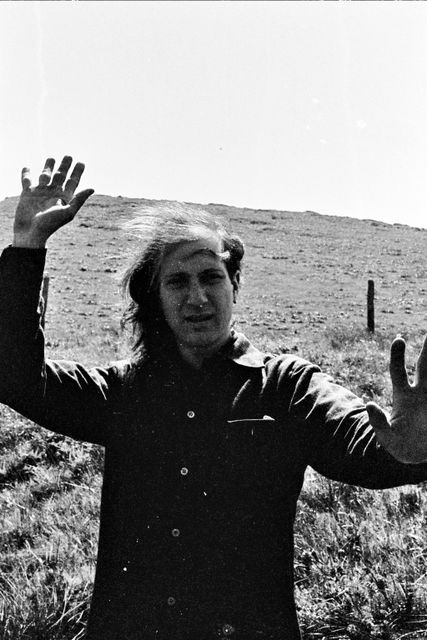
So yes, LSD was very important, youth was hugely important, this particular moment in time was important—of course everything is always predicated on those kinds of things, I believe.
The Digger thing was kind of unique in that we didn’t consider ourselves to be “hippies,” at all. In fact, it was, to me, an affront. We considered ourselves to be social, political and economic anarchists. We could see that we were “leaders,” if you will, by example. Because there wasn’t anybody who said, “This is what we do today.” It was just leading by example in the community. A lot of the things that we tried to instill in other people never happened. A huge but informative disappointment. It was a very short-lived run — a couple of extraordinary years. I mean, it wasn’t officially anything. You know all the clichés: people coming into free stores and saying, Who’s in charge, and being told they were, and people stealing stuff in free stores. But if you looked closely you could see the seeds of change like diamonds in the sand.
The Diggers had friends in the Grateful Dead. What do you remember about that connection?
I went to New York on a couple different drug deals to raise money for what we were doing. I took the draft text of the Diggers Papers to the Realist office, and had been given by [Grateful Dead co-manager] Danny Rifkin a shoebox full of STP, whatever that was, to sell in New York, where I had some contacts. You want the details? I haven’t got any details for you. I remember going to the Realist office, I remember having the STP, I know it came from Danny, through the Dead. Danny was one of the few in the Dead family that we had anything really tight with. Jerry [Garcia] was a good guy. Pigpen was a good guy. The rest of them were into show business, money and all that. Well, that’s what I saw. But I was a snob of sorts, I guess. Too judgmental.
The Grateful Dead lived across the street from one of the houses we lived in, from Paula McCoy on Ashbury Street. Paula had been married to a guy whose name was Don McCoy who had actually brought a guru over from India, and he was living in Olompali.
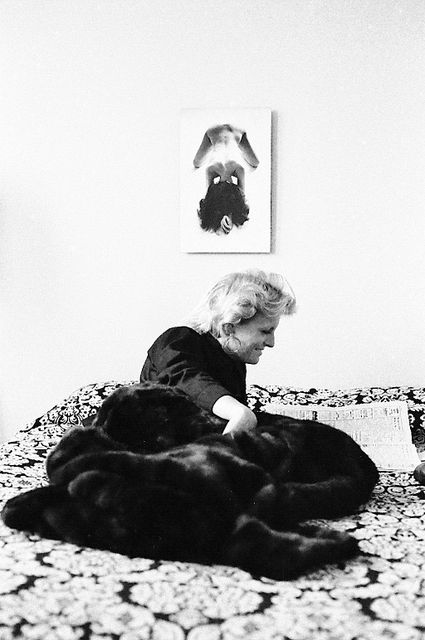
Danny had rented the house across the street, and needed roommates. The roommates showed up in the form of the Warlocks. And they moved in. That’s how I met them. I don’t know what Danny’s connection [to the Diggers] would have been prior to that. Maybe through Artists Liberation, I don’t know. That’s kind of how I met Danny: on the street, playing softball. Some people that lived on the street didn’t like this, but we played anyway. I remember that house. That house had the original gas jets still in the wall. Without the globes on the things, still in the wall. So that’s how we met Danny: getting high on the stoops. In those years in our community everyone knew everyone.
The Dead was one of the bands that we could count on to be supportive of our activities and come and play for us if necessary. The Jefferson Airplane? Not a fuckin’ prayer. Those people were living on the other side of the park. I can show you the house they lived in, with long columns on it. They were living in a different world. And there were some bands that would play with us and some that wouldn’t. Janis [Joplin] was very much a player until she got to be really a superstar. Albert Grossman and people like that hung around at Paula McCoy’s house; those guys were always around because of the rock scene.
The rock scene I think was very appealing to people like Emmett and so forth because there was a lot of money and flash and notoriety and that kind of stuff.
Did you know Owsley?
I barely knew him. I had taken plenty of his product, but I didn’t really personally know him. I knew who he was, in the way I knew Allen Cohen from the Oracle and guys like that. People were just around. It was a relatively small community… until 1968 or so when suddenly there were tour buses on the street, and it got weird, you know? It became, What’s going on here? Because remember, what you see on Haight Street today is bizarre. None of this was here. None of it. That was a bank. This was a delicatessen, this was a shoe store. It was a neighborhood. That’s what it was. It was a western extension of the Fillmore. That’s what it was. That’s what the Haight-Ashbury really is. There was no such place. The term ‘Haight-Ashbury,’ like the term ‘hippie,’ was coined by [San Francisco columnist] Herb Caen. He actually made those terms up….
It was very transformative times. I can only speak for myself and for the people I was close to. We were transformed. Peter [Berg] and Judy [Goldhaft] said to me a couple months ago, we were having dinner, and they said something about, ‘the Diggers ruined us.’ And I knew exactly what they meant. They meant, it’s a slippery slope. Our lives and thinking were changed forever.
Look, I went on, because I had to raise my daughter, I went on and I got a job, working for a guy who was drilling gas wells in West Virginia. Now, I’m in the oil business, he’s paying me $3 an hour. I’m raising a child as a single parent. Well then, my life went on from there. But certain things don’t change. Your perceptions become transformed and altered. Things changed forever. You can’t go back. There’s no going back. The forms may change, if you know what I mean by ‘the forms.’ My form is very different from David [Simpson] and Jane [Lapiner]’s forms. But David is one of my closest friends in the world. And yet our forms are completely different. But the substrate of our thought processes are “Digger times”-inspired.
But it is this underlying perception of “how things are”—”paradigm” is the right word, that’s what it means—that was to a very large degree shaped by our experiences on the street. The way in which these things happened. I maintain that we became who we were not just because of the moment in time, although I think that’s always true, but because of drugs and our youth and because of our shared experiences. [When] you go to the San Francisco produce market to get food to give away, right, and you meet the working guys on the dock there, and you SEE what kind of good guys they really are, and then you see the kind of SURPLUS there is in America, and how cavalierly it’s treated…. This kind of thing. Then you also see the fact that the people that you’re trying to help, not just by giving them a meal, but also by transmitting this wisdom, and they just don’t get it. Or they don’t want to get it. This changes who you are. All these things lead you to a common experience with other people similarly situated and it become almost a cult. There are things known just to us [Diggers], by virtue of our shared experiences. ‘Cult’ is too strong a word, but you understand what I mean. You become a very, very tight, extended family. It becomes almost genetic. Our kids get it. Born that way. Go figure.
Emmett didn’t stay in the family. He had to deal with the post-Diggers fallout/comedown all on his own. He was obviously in pain. There’s an interview in the early ’70s where he says, ‘We showed them how to do it and they didn’t want it. So fuck them.’
This was painful. Cleaning up after a big event in the park, filling bags full of garbage because the people who came to the event didn’t bother to pick up their own cigarette shit? What is this? Don’t you guys get it?!? Hello? They didn’t get it. A lot of them didn’t get it. Many people did. But a lot didn’t. The appearance was, a lot didn’t get it. So I mean I shared Emmett’s feeling of angst and disappointment about these things. But it did help clarify, inform and ultimately substantiate our Diggerly instincts. But it hurt.
Emmett was a very complicated person. He was a strange guy. After Siena, I don’t remember Emmett being in a relationship with a woman per se. Not that I was aware of. Well, Paula I think. Emmett never lived with us. He always had his own place. Junkies are tricky people to love.
Everybody felt a certain amount of pathos about him because he kind of got away from us. Whether he got away because of something we did, or he got away because he’d lost faith in what was happening, or he got away because he got too deep into drugs, or whatever it was, we kinda lost him the way we lost Billy Fritsch. I personally felt badly. I missed having Fritsch around. It was exciting being around the Angels up until a point in time when it kind of turned on us. And that really was an event, a very specific event where the Angels had made a conscious decision that this was it. In Olema. Like love between a way young girl and an older guy: it has to end at some point. That was the end of the relationship.
That was sort of the terrible bookend to the beautiful beginning, to that Diggers-led march to the police station to free…
Chocolate George. Exactly. The Angels liked us. The Black Panthers liked us. Kathleen Cleaver once fed me lunch with somebody else because we were involved in the Black Man’s Free Store, which was being put together. Those people liked us. I enjoyed being around Black Panthers, to the degree that we were; much less so around them than we were around Angels. I liked being around the Angels, it was dangerous, exciting. Who am I? Middle-class Jewish kid from Great Neck, hanging around with these guys?!? Killers. Criminals. But they were wonderful. We loved them. Admired them. These guys, you know they would have machine guns and Nazi flags on their walls as art. [laughs] I have pictures of that stuff, I can show you pictures of the insides of Pete Knell’s apartment. I learned about respect, loyalty and bravery from them.
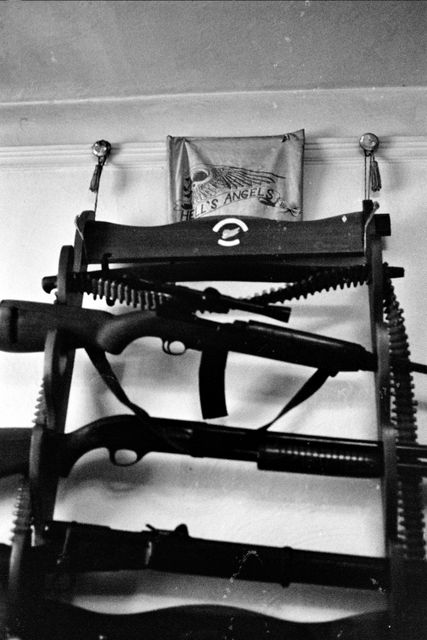
I had to be careful of what I photographed. Like I knew Emmett didn’t want to be photographed. He didn’t want it. So I didn’t take pictures of him. You had to ask first. Respect.
How do you square that with, as you put it, his quest for notoriety?
Whether he really was paranoid or whether it was true, he had this thing that we were all on FBI lists and so forth. We were a danger to the establishment. I’ll tell you a story. I was living in Aspen, Colorado, where David and Jane and everybody used to come and live with us—outside of Aspen, Colorado in a place called Conundrum Creek, WAY in left field, man. Fucking way deep left field. One day there’s a knock on the door. Out there nobody knocks on your door unless it’s a squirrel. It’s not a neighborhood. And there’s two guys outside, wearing suits. They introduce themselves and flash their IDs, we’re the FBI, would I mind looking at some photographs and tell them if I recognized anybody. I said certainly. I knew immediately who they were looking for. I go through the pictures, I go right past Anna’s photograph, keep on going. She had been a Weatherperson, and had been implicated in the bombing of some bank in San Francisco. And I went right past her picture and said, Nope, don’t recognize anybody! Well thank you very much, they said They were doing their job, they checked it off, now they were going to lunch. Bureaucrats, that’s who they really are. That’s the FBI—people think they’re cops? They’re really bureaucrats. But dangerous depending on where you stand. Emmett liked the idea of being an outlaw. It appealed to his sense of theater and to his ego. He was a conflicted guy.
This harassment and surveillance was constantly going on. There would be cars that would slide around in front of the houses we were living in, with two guys in the front, and a little antenna on the back. Who do you think they were?
There was all this paranoia about subversives in America and all this stuff. These were strange times. It was hard to live in those times, and believe in anything except ourselves because our culture obviously was a sham. Right? We had learned that from our own activities, and from drugs, and from other things. Our political systems, even the radical political systems that many people had espoused—the Marxists, the Trotskyites, all the other fancy guys who were out there—that was all proven to be mostly untenable nonsense.
It was a paranoid time. Y’know? Our heroes being killed. The Kennedy brothers: heroes, killed. Martin Luther King: hero, killed. All these guys. What the fuck is going on here? When they killed Martin Luther King, I then became sure that there was CLEARLY a conspiracy and to this day I think there was, to kill these people. I don’t doubt it for a fucking minute. I don’t doubt it for a minute and I think it was an inside conspiracy or ruling class struggle that did involve Hoover, and all of those stories that have come up again and again, I believe they’re true.
Anyway, be that as it may, our family was a mechanism that helped insulate you from the outside. And as the Digger thing progressed and then went on, this Free Family notion became permanent. I mean, my best friends today are still those same people that I ran with in my twenties.The same people. David and Jane, Freeman and Peter and the Bergs and Nina and Vinnie and Kent and our children. Our children all got raised together. I always say they were “snot bonded.” It’s actually morphed into a biological family of friends, a tribe. It’s wonderful and amazing.
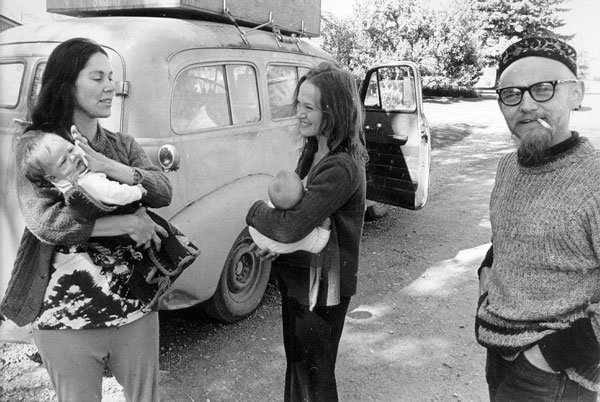
The Diggers weren’t conventional activists, pleading their case in protests and such.
We weren’t talking, we were doing. The Do was the thing. Life acting, Berg called it. And it was. And it changed you. Practice. Like working on music or meditation.
And when it was talk, it was beautiful talk—because it’s poets and playwrights and theater actors talking.
Yeah. Well I’ll tell you that I certainly was not one of the real talented, verbose people. But you had people like Freeman: incredibly articulate. You have Peter Berg: incredibly brilliant. David Simpson and Kent Minault, Emmett, Lenore and Claude… all these people—articulate, charismatic, perceptive people. I think that talk/think was an influence on what happened. Unfortunately, we wanted to see a complete revolution, if you will, a transformation, and of course that may have just been our youthful naivete. Who knows what it was. But it was fantastic and beautiful and true and nothing was ever the same after those times.
They were wonderful, wonderful, magical times. It was incredible fun. It was incredibly empowering. I would submit to you, from my point of view again, I was really “born” during that time. I became the person to a large degree that I am now. I came out of a shell that I was in. I was raised in a very close-knit middle class American Jewish family in an affluent community. I had never been around a lot of the things… Billy Fritsch had been a longshoreman; what did I know about stuff like that?
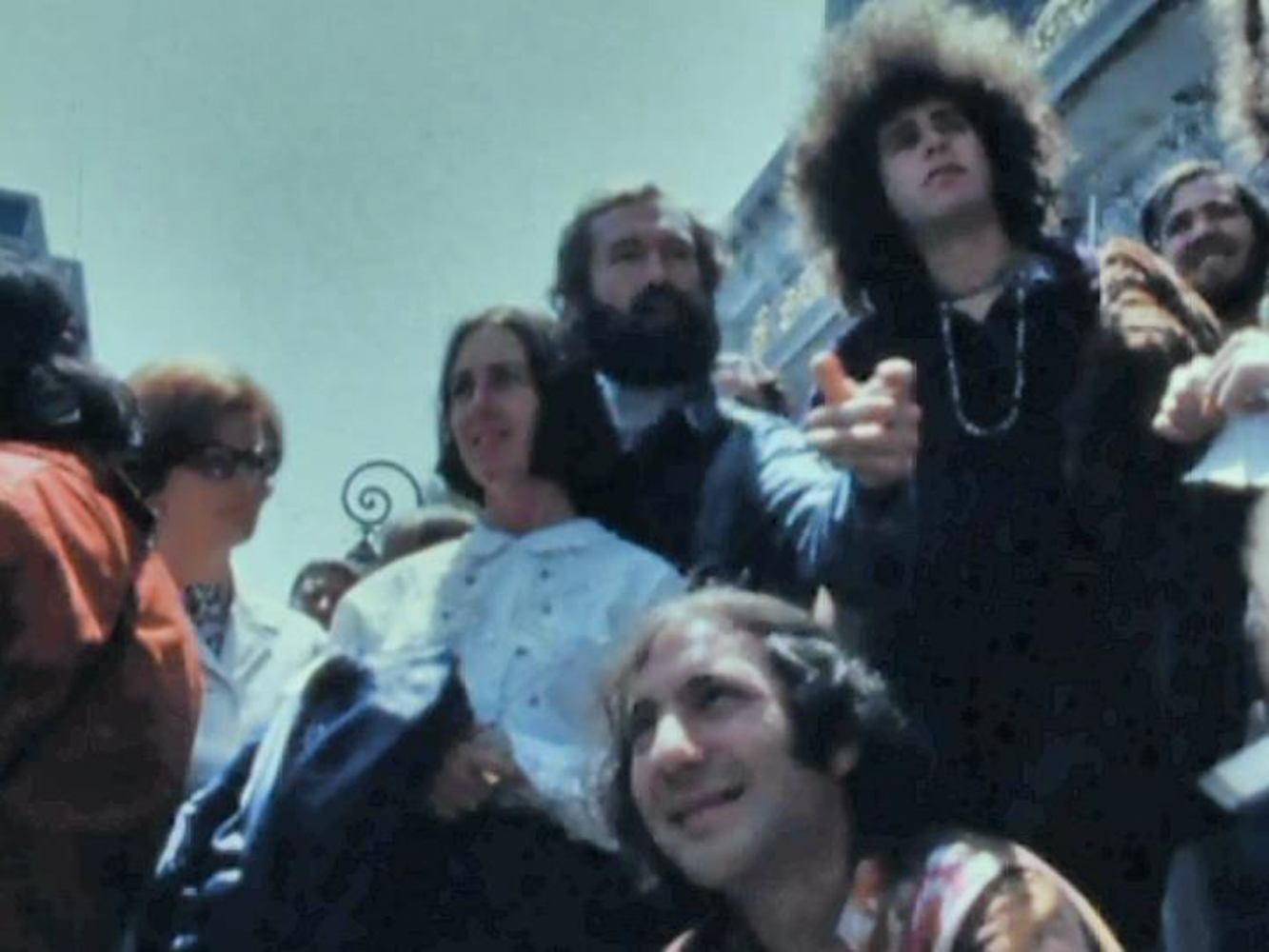
How did your family back home understand what you were doing?
Had no clue. Had absolutely no clue. In fact by then I didn’t feel alienated from them but they weren’t really dealing with me anymore. I was supposed to have gone to medical school, blah blah blah. I’d dropped out and disappeared off the face of the earth. For me the realization of that alienation took place when I made a collect phone call home and my father refused the charges. That to me was the A-HA! moment. [laughs] Things have changed. You’ve arrived, you’re on your own now, son. Congratulations, you’ve grown up. That was a biggie. And a little scary at first. Change is scary, right.
How did you avoid the draft?
Not easily. I had a mild case of polio when I was a little boy and I’m deaf in my right ear as a result. I was called to an induction center in Denver, Colorado. I was in Aspen at that moment. They called me and I went to this awful place swarming with soon to be in body bags kids like me and I got a 1-Y deferral because of the deafness in my ear, which stood for one-year deferral, literally. And I was told that in May of the next year they were changing the rules because they needed the men and anybody who could hear in one ear would be inducted. The army guy said to me, “We’ll see you next year.” And I said to myself, You ain’t seeing me ever again, preparing to do whatever I had to do. I wasn’t going to Vietnam, that’s for sure. And, I never heard from them again. Don’t know why. Don’t care why. “Why” gets you the boobie prize; what so is what’s real.
Diggers did events but not protests, not demonstrations per se.
By 1967 or 8, I was realizing that all of these anti-war demonstrations were counterproductive because the media, and the government, would use those events to create a picture of what was going on that was not true. Sound bites. Selective editing of footage. That kind of thing. I also thought that what people were demanding were irrelevancies anyway. That a lot of it was the old stuff.
We were trying to empower people with their innate own power. Although we might not have articulated it precisely that way, but I mean, you go down the street on the back of a Hell’s Angel motorcycle, throwing dimes at people, handfuls of dimes in the air: this has an impact on people. It does, you know it does. You can get up and have a rally against money but probably everything you hear will be the wrong message. ‘Well, they’ve got too much money, we want some of their money.” This would be the message. Our message would be, We don’t want any of that shit at all. No one should have any money anyway! It’s the wrong medium of exchange. But free money? That had power. That said everything you needed to know about money in a corrupt society.
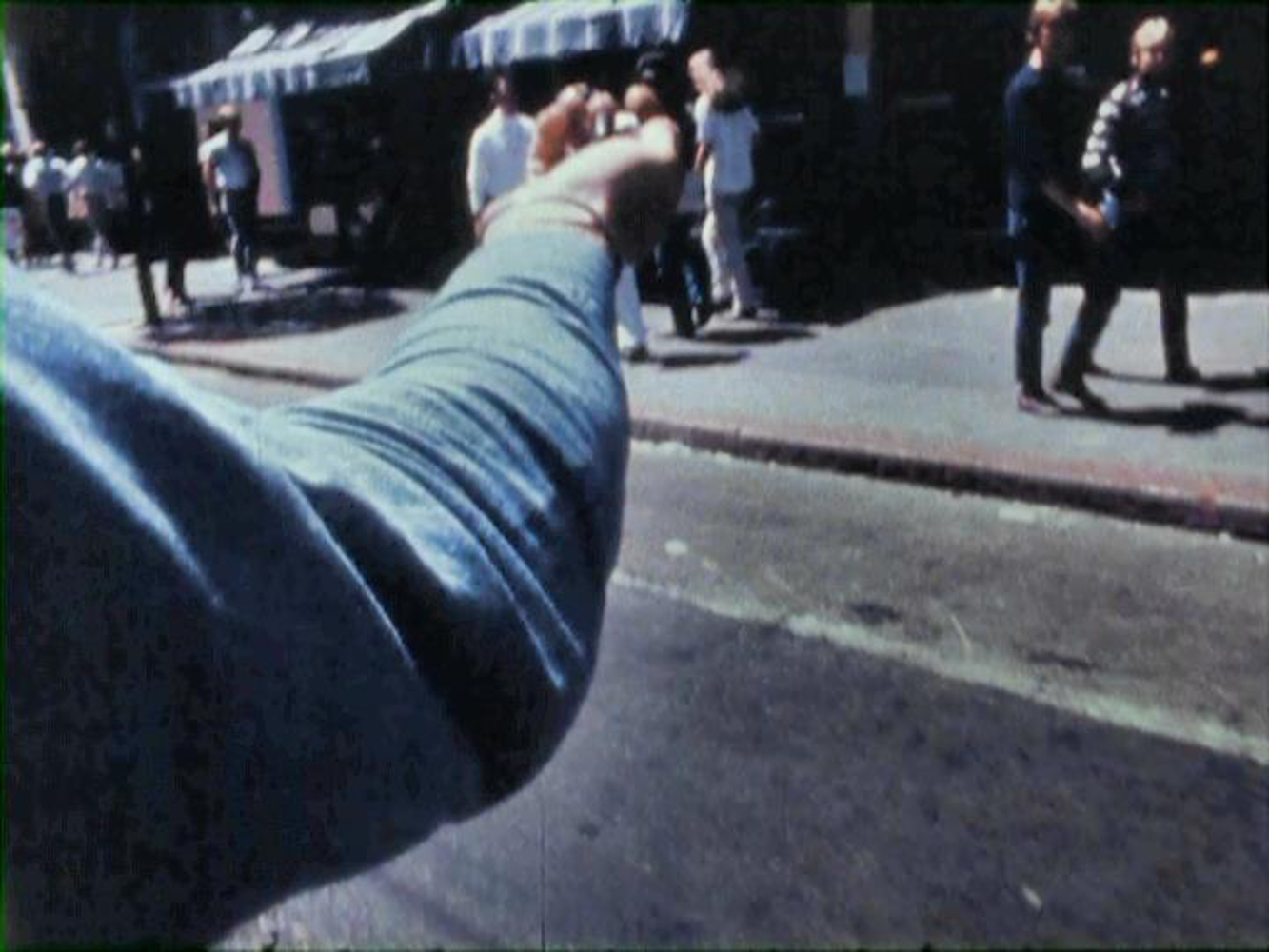
So our thing was a very different than what the mainstream lefty community was dealing with. It didn’t put us at odds with mostly everyone else. For instance. The Yippie thing that Hoffman and Jerry Rubin were doing was laughed at by the Diggers because it seemed to be so inappropriate and so silly and such a pandering to fame and the national press and so forth. And it was inherently inside the very system they were supposedly against. A contradiction. Now, there may have been some Digger ego involved—there’s always ego involved—I’ve been studying Buddhism for ten years and you just don’t get away from the ego… There may have been some ego involved. Them/Us. But we weren’t really trying to influence anybody, it wasn’t that way, although, yes, there may have been some people that were into that sort of thing. Ego.
Diggers burned money in public. That is so intense.
It was a thing. People were always burning their draft cards, burning five-dollar bills. Burning draft cards was powerful also because it was an absolute Fuck You to the authority. And this was done in public, with news cameras running, by people who could have cared less. This was ASTOUNDING to people who were not as far-out and changed as we were, as far gone as we were. To see someone having that level of audacity! The government issued you that card? How can you burn it? People would look at them like, You must be kidding.
We did lots of things like that. Playing movies on the walls of buildings in the Haight-Ashbury. Free stores. Unheard of! These were huge events. Transformative. I can tell you stories about Kent Minault and I going and stealing concrete to build a free bakery, and getting back to the Red House in Forest Knolls and discovering that in the dark we had stolen 50-pound bags of sand. Oh! Offloading the sand, and going back at dawn and stealing the concrete! Those stories we can tell you, they’re endless. But what was really going on there, you know? What was behind all this stuff? What was this “free” thing? What was this notion that everything was intrinsically free? That began to kind of have inherent problems as events progressed. When you live communally, you very quickly see those things. You get somebody who has a totally inappropriate notion with respect to ‘free’ and thinks that your kid and your wife and your truck or bed, well it’s all free. Well excuse me but that’s not exactly what we meant. And then you have these problems with people who don’t get it, or who get it imperfectly, that kind of thing. It created a subtle tension.
I now feel that the people most influenced by Diggers activities were ourselves and to a lesser degree the people that were around us. I mean, I know we influenced people who we didn’t know, but I don’t know who they were, where they went and what happened to them. It’s a pebbles thrown into a pond kinda effect.
Free food: there’s something incredibly powerful about feeding other people. Both the person feeding and the person being fed. The Giver, The Receiver and The Gift. There is this extraordinary union that takes place—especially when the food is free, and there’s no consideration being offered or asked for, or anything like that. It is simply a gratuitous feeding of one’s self, if you will, where it begins to really break down the distinction between self and other. Thou Art That. Hindu expression.
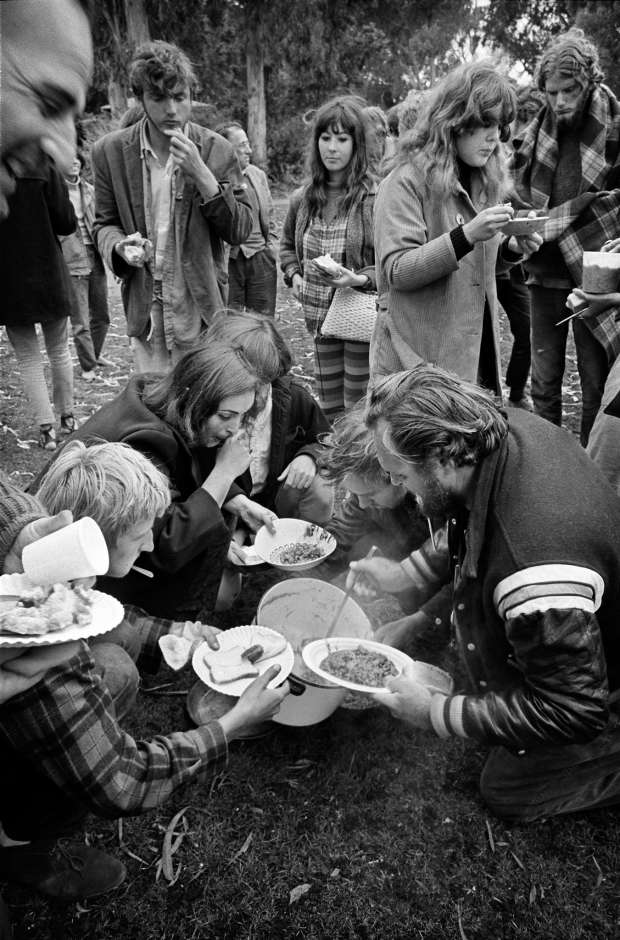
Even between family and non-family…
Right. All those distinctions start to fade away and THAT was really what we were looking for. I mean, it’s kind of a Buddhist concept: no self and other distinctions. No duality. If you wanna talk about duality, then self and other is an articulation of duality. And those things start to break down just by virtue of what you’re doing. You don’t necessarily know that it’s a Buddhist concept, or it’s called ‘duality’ or whatever it’s called, but suddenly you’re in this new world. The light is kind of pink, and the music… Something sweet happens. Its real freedom. It’s transformative, and as I find with seated meditation, sometimes you sit and meditate and nothing happens. But later, something happens, and you go, Oh I attribute that to this. This realization I’m having, or insight, I know is related to my sitting. Those kinds of things are similar to Diggerly Do’s.
I’m glad I did it. It was really the best of times. Period. The worst of times was all outside. And because, once again, it was the outside times that helped instigate, stimulate and formulate what happened. You can’t point to any one thing in my opinion and say, This is why it happened. It was all of these brilliant people. It was the influence of the artists and the poets that were so near and dear and who articulated what was going on. It was the evolution from beatniks to hippies to back-to-landers to environmentalists to who knows what happens next.
It was just us being part of the whole wave of the times, of history, of the new dialectic perhaps that leads us to the next present moment. And the next present moment. And, the next present moment after that. The Diggers were a vehicle. An ideal, if you will. No one knew where it would lead us but we were all-in and all aboard.
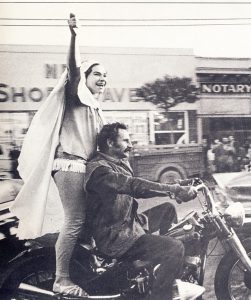
This is brilliant!
LikeLike
Thanks so much for this gift – a very rewarding, honest, gritty, and beautiful companion to pt 1.
The exploration of the times through Gould’s zen learnings animate the Diggers’-past with truths missing in popular culture’s memory of “flower-power”.
LikeLike
Wow. Excellent. Chuck is an intellectual of the rare kind, to be admired and grateful to know. I deeply enjoyed the truths I share described with honesty. I loved reading about his path during and since that time. Thanks Jay, for chronicling our Digger times so artfully.
LikeLike
Thanks to both of you
LikeLike